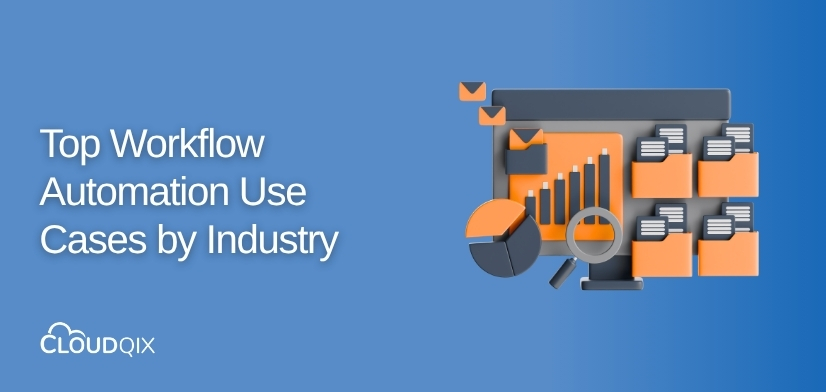Workflow automation is transforming how modern organizations operate. From finance and logistics to HR and software development, companies are using AI automation and automated workflows to streamline business processes, reduce manual effort, and scale efficiently.
What once required multiple systems and endless spreadsheets can now be handled by unified process automation. These connected workflows allow teams to focus on innovation while the system takes care of repetitive, error-prone tasks like approvals, document routing, and data synchronization.
Different industries are harnessing workflow automation use cases to improve performance and agility.
Finance Workflow Automation Use Cases
In finance, speed and precision are everything. Automation ensures transactions are accurate, compliant, and traceable without slowing down operations.
Financial teams are using automated workflows to:
- Process Loans Faster: Automatically collect, validate, and route applications for approval, cutting down decision times and human errors.
- Handle Claims Efficiently: Use rule-based routing to review and approve claims faster while maintaining transparency with customers.
- Enhance KYC & Risk Scoring: Integrate real-time verification tools to automate compliance checks and risk calculations.
- Simplify Invoice Processing: Automate invoice extraction, cross-checking with purchase orders, and payment scheduling for end-to-end visibility.
Finance departments also benefit from linking their automation through a business integration platform, ensuring that data flows securely between accounting, CRM, and banking systems.
By centralizing these process automation tools, financial organizations can minimize risk, meet compliance standards, and focus on customer experience instead of manual paperwork.
Retail & eCommerce Workflow Automation Use Cases
In retail and eCommerce, every process, from checkout to delivery, impacts customer experience. Automation helps brands stay consistent, accurate, and quick.
Retailers are applying AI automation to:
- Boost Sales & Lead Generation: Automatically qualify and nurture leads, assigning them to the right teams for timely follow-up.
- Streamline Logistics & Supply Chain: Coordinate inventory, shipping, and warehouse operations through connected automated workflows.
- Enhance Customer Support: Use chatbots for FAQs, smart ticket routing for complex inquiries, and automated satisfaction surveys to collect feedback.
- Automate Order Processing: Confirm orders, validate payments, and trigger shipping updates automatically, ensuring transparency and reliability.
These workflows often rely on an integration platform as a service (iPaaS), a cloud-based framework that connects sales, marketing, and fulfillment systems seamlessly. The result: fewer delays, fewer errors, and happier customers.
Workflow Automation Use Cases for Software Teams
Automation for software teams is essential to speed, consistency, and quality control. From coding to deployment, workflow automation keeps projects running smoothly without bottlenecks.
Teams use AI-driven workflows to:
- Run automated code reviews and unit tests whenever new code is committed, improving reliability.
- Log, assign, and track bugs automatically in platforms like Jira or GitHub.
- Handle deployment and release management across environments to reduce manual configuration.
- Automate team notifications and reporting, sending updates in Slack or Teams when builds pass, releases go live, or metrics change.
With connected systems and self-healing pipelines, developers can focus more on innovation and less on repetitive tasks. Linking automation through an automation platform or integration platform ensures full visibility and coordination across teams.
Workflow Automation in Transportation Logistics
Few industries rely on precision like logistics. Even minor delays can create chain reactions that affect costs, schedules, and customer satisfaction. Workflow automation keeps every moving part in sync.
Transportation and logistics companies use process automation to:
- Consolidate Fleet & Route Data: Sync GPS tracking, scheduling, and telematics into a single view for real-time insights.
- Automate Scheduling & Compliance: Set up digital reminders for maintenance, safety checks, and documentation requirements.
- Integrate Booking & Customer Service: Connect ticketing, billing, and support systems so updates and notifications happen instantly.
- Scale Carrier & Partner Onboarding: Use automated workflows to verify documents, approve accounts, and sync permissions.
These systems are often supported by expert system integration services that connect legacy logistics tools with modern cloud systems.
Top Workflow Automation Use Cases by Job Function
While every industry has unique challenges, automation transforms job functions across the board.
- IT: Automate system monitoring, user provisioning, and software updates to improve uptime and reduce manual work.
- HR: Simplify onboarding, payroll integration, and policy compliance with automated workflows that save time and ensure consistency.
- Operations: Manage scheduling, approvals, and reporting through integrated workflows that standardize execution across locations.
- Marketing: Trigger campaigns, sync analytics, and personalize communication automatically based on customer data.
- Sales: Automate CRM updates, lead assignment, and quote generation to improve conversion rates and reduce delays.
Each department gains visibility and control, while the organization as a whole moves faster and operates more efficiently.
Accelerate Workflow Automation with CloudQix
Automation delivers its greatest value when it’s simple, scalable, and secure. That’s where CloudQix stands out.
As a no-code automation platform, CloudQix allows businesses to connect systems, orchestrate processes, and deploy workflow automation solutions without development overhead.
Ready to see it in action? Start with CloudQix today!


